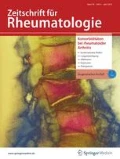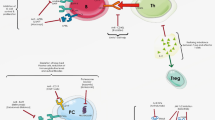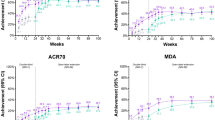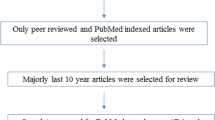Summary
Objective: To study the long-term efficacy and safety of methotrexate (MTX), intramuscular gold, azathioprine (AZA), chloroquine (CQ), sulphasalazine (SASP), and D-penicillamine (DPA) in rheumatoid arthritis (RA) patients.
Methods: Between 1979 and 1994, clinical data were prospectively gathered in a single center. 1681 patients were followed-up for at least 4 years. A 50% reduction of the swollen joint count was required to continue therapy. In addition, a modified Lansbury index, the Keitel function test, and laboratory parameters were determined every six months. Side effects leading to the discontinuation of treatment were recorded as well.
Results: After an observation period of more than four years, 39.6% and 28.3% of patients were taking MTX and AZA, respectively; 18.2% were receiving gold, 16.9% remained on DPA. SASP and CQ were still applied in 13.5% and 6.6%. MTX, AZA and SASP had a drop-out rate due to toxicity of 15.9%, 15.3% and 17.7%, whereas 34.8% had to discontinue CQ (gold: 27.4%, DPA: 26.9%). The majority of dropouts occurred within the first year of treatment. Subgroups of seropositive patients and patients with rheumatoid nodules had a poorer treatment efficacy irrespective of the DMARD.
Conclusion: In the long-term application, MTX was the most efficient compound, followed by AZA, whereas CQ had the poorest drug survival. Our results underline the value of long-term observations under the conditions of clinical practice as a supplement to controlled clinical trials.
Zusammenfassung
Ziel der Arbeit: Untersuchung der Langzeiteffektivität und Verträglichkeit der Basistherapie mit Methotrexat (MTX), Azathioprin (AZA), intramuskulärem Gold, D-Penicillamin (DPA), Sulfasalazin (SASP) und Cholorochin (CQ) bei rheumatoider Arthritis (RA).
Methoden: Zwischen 1979 und 1994 wurden Daten von 1681 Patienten des Rheumazentrums Rostock prospektiv erfaßt. Eine 50%ige Reduktion der Anzahl geschwollener Gelenke war erforderlich, um die Therapie fortzuführen. Zusätzlich wurden in halbjährlichen Abständen ein modifizierter Lansbury-Index, der Bewegungsfunktionstest nach KEITEL sowie akute-Phase-Parameter erfaßt. Nebenwirkungen, die zum Abbruch der Therapie führten, wurden ebenfalls festgehalten.
Ergebnisse: Nach einer Beobachtungszeit von mindestents vier Jahren nahmen noch 39,6% bzw. 28,3% der Patienten MTX bzw. AZA ein. 18,2% bekamen Gold, 16,9% DPA. SASP und CQ wurden von 13,5 bzw. 6,6% der Patienten eingenommen. Die Abbruchraten wegen Nebenwirkungen (NW) betrugen für MTX, AZA and SASP 15,9%, 15,3% bzw. 17,7%, während 34,8% CQ wegen NW absetzten (Gold: 27,4%, DPA: 26,9%). Die Mehrzahl der Therapieabbrüche erfolgte bereits im ersten Jahr der Behandlung. Subgruppen seropositiver Patienten bzw. Patienten mit Rheumaknoten oder erosiven Verläufen hatten ein schlechteres Ansprechen auf die Behandlung, unabhängig von der Art des eingesetzten Basistherapeutikums.
Schlußfolgerung: MTX war in der Langzeittherapie die effizienteste Substanz, gefolgt von AZA, während CQ die geringste Rate von Langzeitanwendern aufwies. Die Ergebnisse unterstreichen den Stellenwert von Langzeitbeobachtungen unter klinischen Alltagsbedingungen in Ergänzung zu kontrollierten klinischen Studien.
Similar content being viewed by others
Author information
Authors and Affiliations
Additional information
Received: 18 June 1999 Accepted: 2 August 1999
Rights and permissions
About this article
Cite this article
Keysser, M., Keyßer, G. & Keysser, C. Long-term application of disease modifying antirheumatic drugs (DMARD). A single-center, observational study of 1681 patients with rheumatoid arthritis (RA). Z Rheumatol 58, 267–276 (1999). https://doi.org/10.1007/s003930050181
Published:
Issue Date:
DOI: https://doi.org/10.1007/s003930050181




